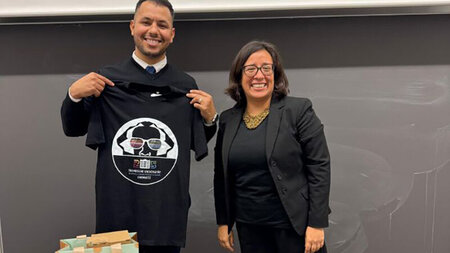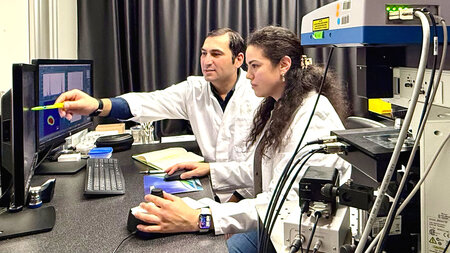Professorship for Research Methods and Evaluation in Psychology
Visitor Address
Secretary Susanne Möldner, Room 011B (new: B01.011.2)
Wilhelm-Raabe-Str. 43,
09120 Chemnitz
Tel.: +49 371 531-28450
Address
TU Chemnitz, Institute of Psychology, Research Methods and Evaluation, 09107 Chemnitz
Recent Publications
Henninger, M., Malejka, S., & Titz, J. (2025). Contrast analysis for competing hypotheses: A tutorial using the R package cofad. Behavior Research Methods, 57(12), 326. https://doi.org/10.3758/s13428-025-02833-w
Titz, J. (2025). State-trace analysis meets personality measurement: Why the Big Five tests are not based on five latent dimensions and how to fix them. PLOS ONE, 20(2), e0317144. https://doi.org/10.1371/journal.pone.0317144
Titz, J. (2025). The relationship between the phi coefficient and the unidimensionality index H: Improving psychological scaling from the ground up. Psychological Methods. https://doi.org/10.1037/met0000736
Matko, K. & Sedlmeier, p. (2023). Which meditation technique for whom? An experimental single‑case study comparing concentrative, humming, observing‑thoughts,and walking meditation. Mindfulness, 14, 2848–2867 https://doi.org/10.1007/s12671-023-02248-8
Sedlmeier, P. (2023). What mindfulness, and for whom? And why might it work? Mindfulness. https://doi.org/10.1007/s12671-023-02218-0
Sedlmeier, P., Winkler, I., & Lukina, A. (2023). How long did the time spent in meditation feel? "Attention. Attention. Attention." Psychology of Consciousness: Theory, Research, and Practice, 10, 346-367.
Henschke, E., & Sedlmeier, P. (2023). What is self-love? Redefinition of a controversial construct. The Humanistic Psychologist, 51(3), 281-302. https://doi.org/10.1037/hum0000266
Sedlmeier, P., Beckel, A., Conrad, S., Husmann, J., Kullrich, L., Lange, R., Müller, A.-L., Neumann, A., Schaaf, T., Schaub, A., Tränkner, A., & Witzel, B. (2023). Mindfulness meditation according to the Satipatthana Sutta: A single‑case study with participants as collaborators. Mindfulness. https://doi.org/10.1007/s12671-023-02160-1
Winkler, I. (2023). Einflussfaktoren auf das Zeitempfinden. In H. Fink & R. Rosenzweig (Hrsg.). Zeit· Geist· Gehirn: Neurowissenschaft und Zeiterleben. (S. 89-98). Kortizes.
Titz, J. (2022). Introducing fastpos: A fast R implementation to find the critical point of stability for a correlation. The R Journal, 14(3), 512. https://doi.org/10.32614/RJ-2022-041
Winkler, I., & Sedlmeier, P. (2022). Evaluation. In A. SchĂĽtz, M. Brand, & S. Steins-Loeber (Hrsg). Psychologie: Eine EinfĂĽhrung in ihre Grundlagen und Anwendungsfelder (6. Aufl.). (S. 175-186). Kohlhammer.
Matko, K., Sedlmeier, P., & Bringmann, H.C. (2022). Embodied Cognition in Meditation, Yoga, and Ethics—An Experimental Single-Case Study on the Differential Effects of Four Mind–Body Treatments. International Journal of Environmental Research and Public Health,19,11734. https://doi.org/10.3390/ijerph191811734
Burkhardt, M., Titz., J., & Sedlmeier, P. (2022). Datenanalyse mit R: Fortgeschrittene Verfahren. Pearson Studium.
Matko, K., Berghöfer, A., Jeitler, M., Sedlmeier, P., & Bringmann, H.C. (2022). Who Benefits Most? Interactions between Personality Traits and Outcomes of Four Incremental Meditation and Yoga Treatments. Journal of Clinical Medicine, 11, 4553. https://doi.org/10.3390/jcm11154553
Sedlmeier, P. (2022). The psychology of meditation: Varieties, effects, theories, and perspectives. Hogrefe Publishing.
Bringmann, H. C., Michalsen, A., Jeitler, M., Kessler, C. S., Brinkhaus, B., Brunnhuber, S., & Sedlmeier, P. (2022). Meditation-based lifestyle modification in mild to moderate depression--A randomized controlled trial. Depression and Anxiety, 39:363–375. DOI: 10.1002/da.23249
Walach, H., Kirmse, K., A., Sedlmeier, P., Vogt, H., Hinterberger, T., & von Lucadou, W. (2021). Nailing jelly: The replication problem seems to be unsurmountable--two failed replicatoins of the matrix experiment. Journal of Scientific Exploration, 35, 788–828.
Sedlmeier, P., & Srinivas, K. (2021). Psychological theories of meditation in early Buddhism and Samkhya/Yoga. In M. Farias, D. Brazier, & L. Mansur (Eds.). The Oxford Handbook of Meditation. (pp. 547-568). Oxford: Oxford University Press.
Titz, J., & Burkhardt, M. (2021). cofad: An R package and shiny app for contrast analysis. Journal of Open Source Software, 6(67), 3822. https://doi.org/10/gnhcrq
Sedlmeier, P. & Burkhardt, M. (2021). Datenanalyse mit R: Beschreiben, Explorieren, Schätzen und Testen. München: Pearson.
Henschke, E., & Sedlmeier, P. (2021). What is self-love? Redefinition of a controversial construct. The Humanistic Psychologist. Advance online publication. https://doi.org/10.1037/hum0000266
Matko, K., Bringmann, H. C., & Sedlmeier, P. (2021). Effects of different components of yoga: A meta-synthesis. OBM Integrative and Complementary Medicine, 6(3). https://www.lidsen.com/journals/icm/icm-06-03-030
Matko, K., Sedlmeier, P., & Bringmann, H. C. (2021). What makes yoga effective? Differential effects of ethical education, physical yoga, and mantra meditation on well-being and stress. Frontiers in Psychology, 12. https://doi.org/10.3389/fpsyg.2021.672301
Bringmann, H. C., Vennemann, J., Gross, J., Matko, K., & Sedlmeier, P. (2021). “To be finally at peace with myself”: A qualitative study reflecting experiences of the Meditation-Based Lifestyle Modification Program in mild-to-moderate depression. The Journal of Alternative and Complementary Medicine. DOI: 10.1089/acm.2021.0038
Matko, K., Ott, U., & Sedlmeier, P. (2021). What do meditators do when they meditate? Proposing a novel basis for future meditation research. Mindfulness. https://doi.org/10.1007/s12671-021-01641-5
Titz, J., & Sedlmeier, P. (2021). Judgments of frequency and duration: One or two Underlying Dimensions? Judgment and Decision Making, 16(2), 460–483. http://carter.psych.upenn.edu/journal/20/200831/jdm200831.pdf
Bringmann, H. C., Bringmann, N., Jeitler, M., Brunnhuber, S., Michalsen, A., & Sedlmeier, P. (2021). Meditation based lifestyle modification (MBLM) in outpatients with mild to moderate depression: A mixed-methods feasibility study. Complementary Therapies in Medicine, https://doi.org/10.1016/j.ctim.2020.102598
Bringmann H, C, Bringmann N, Jeitler M, Brunnhuber S, Michalsen A, Sedlmeier P. (2020). Meditation-based lifestyle modification: Development of an integrative mind-body pogram for mental health and human flourishing. Complementary Medicine Research. https://www.karger.com/Article/FullText/512333#
Schott, T., Haarig, F., Burkhardt, M., & Barth, T. (2020). Lohnt es sich an meiner Sucht zu arbeiten?. Suchttherapie. https://www.thieme-connect.com/products/ejournals/abstract/10.1055/a-1240-6438
Sedlmeier, P., Winkler, I., & Lukina, A. (2020). How long did the time spent in meditation feel? “Attention. Attention. Attention.” Psychology of Consciousness: Theory, Research, and Practice, Online first https://doi.org/10.1037/cns0000254
Walde, P., & Lungwitz, V. (2020). Rückfallbegünstigende und rückfallprotektive Faktoren nach der Entlassung aus dem Maßregelvollzug. Forensische Psychiatrie, Psychologie, Kriminologie, 1–10. https://doi.org/10.1007/s11757-020-00615-y
Titz, J. (2020). mimosa: A modern graphical user interface for 2-level mixed models. Journal of Open Source Software, 5(49), 2116. https://doi.org/10.21105/joss.02116 [Online App: https://mimosa.icu]
Burkhardt, M. (2020). JoF: Modelling and Simulating Judgments of Frequency. R package version 0.1.0. Zugriff unter https://CRAN.R-project.org/package=JoF
Sedlmeier, P., & Theumer, J. (2020). Why do people begin to meditate and why do they continue? Mindfulness, 11, 1527-1545.
Brockhaus, F., & Sedlmeier, P. (2020). Using pictograms improves the understanding of stock-flow systems. In N. Ceccarelli & C. JimĂ©nez-MartĂnez (Eds.). 2CO: COmmunicating Complexity: Contributions from the 2017 Tenerife Conference (pp. 19-26). Santa Cruz de Tenerife: Universidad de La Laguna
Titz, J. (2020). passt: An R implementation of the Probability Associator Time (PASS-T) model. Journal of Open Source Software, 5(46), 1900. doi: 10.21105/joss.01900












